Archives of (Im)mobility:
Gender, Access and Wage labour through the
prism of the Colonial Nigerian Railway system in
South-Western Nigeria.
Text by Sarafadeen Bello
Images by Sarafadeen Bello, Grace Michael, Timilehin Oludare, Lagos Urban Development Initiative & Bristol Archives
20 min read
The
Nigerian Railway system constructed and managed by the British colonial authorities
played a significant role in the amalgamation and formation of Nigeria. Created
in 1898, it contributed to the urbanization and development of towns, led to advancements
in technical education and skills transfer, allowed for the movement of people,
goods and services; promoted agricultural development, was the largest employer
of wage labour, led to the development of sports, the emergence of social clubs
as well as contributed to the decolonization and independence movement through
the unionization of railway workers.
However, the railway system was also an imperialist project forged by a capitalist system geared towards extracting and amassing resources, connecting inland sites of production to coastal ports of distribution and departure. It also contributed to socio-economic changes and shaped perceptions of masculinity, gender and family which still permeate modern-day Nigerian society.
![A view of crowds gathered before a railway building, with a group of children sitting in the foreground. This is a children's excursion arranged as part of the opening ceremonies for Lagos Government Railway. Caption reads: LGRly. Opening Ceremonies. Children’s Excursion to Agege Iddo …. ide Station. March 4th 1901.]() By
1901, the government railway had an estimated 10,000 workers, and reached around
30,000 workers by 1960. While the rail system helped many workers acquire
skilled and wage labour, women were mostly excluded from these opportunities.
Social constructs reinforced through colonially imposed categorization and
usage of the term “breadwinner”,
restricted women’s access to wage labour. Which served as employment for mostly
men, brought about upward social mobility, movement of workers and commodities
across various regions of the country. Also, during this period within the
railway system, gender and this European-imposed categorization which was
embraced by rail workers were used as tools for negotiation and demanding wage
increases, allowances and benefits from their employers.
By
1901, the government railway had an estimated 10,000 workers, and reached around
30,000 workers by 1960. While the rail system helped many workers acquire
skilled and wage labour, women were mostly excluded from these opportunities.
Social constructs reinforced through colonially imposed categorization and
usage of the term “breadwinner”,
restricted women’s access to wage labour. Which served as employment for mostly
men, brought about upward social mobility, movement of workers and commodities
across various regions of the country. Also, during this period within the
railway system, gender and this European-imposed categorization which was
embraced by rail workers were used as tools for negotiation and demanding wage
increases, allowances and benefits from their employers.
The status of being the breadwinner and income provider in families benefited male workers in many ways. However in reality many women also supported their families through income generated from trading, handcrafting and other activities; works that were considered informal because they took place outside the formal wage-earning system. While some may argue that the status of male breadwinners benefitted women and wives, giving them claims to parts of the men’s salaries; it simultaneously served to form views around masculinity, provided financial security, upward mobility for the male folk and allowed men to have large families which increased their social status in society while reinforcing the perceptions of husband breadwinners and dependent wives which served to diminish the value of work done by girls, women and wives. Attitudes that sadly permeate modern-day Nigerian society.
![Reproduction of a colour photograph of pyramids of groundnuts with a locomotive taken by the Nigerian Railway Public Relations Division, Ebute-Metta, Lagos. (The rail system helped transport commodities such as groundnuts produced from Northern Nigeria to the port of Lagos).]() By
the end of colonial rule and shortly after independence in 1960, the tables
were turned. With increasing road networks, government neglect of the rail
system and the oil boom; reliance on the rail system for the transportation of
commodities declined. Workers lost their jobs and women became breadwinners in
many families sustaining their households with incomes generated from the businesses
they ran.
By
the end of colonial rule and shortly after independence in 1960, the tables
were turned. With increasing road networks, government neglect of the rail
system and the oil boom; reliance on the rail system for the transportation of
commodities declined. Workers lost their jobs and women became breadwinners in
many families sustaining their households with incomes generated from the businesses
they ran.
While this example shows the huge value of women’s labour and work done informally in many communities, changing attitudes towards the value placed on work done by women still remains difficult. Cultural sensibilities around economic status between husbands and wives oftentimes mean women are not able or allowed to be vocal about the financial responsibilities they take on in their households. And the status of breadwinner still determines who gets access to education, jobs, pay raise, opportunities etc. Sadly, these legacies of coloniality, gender categorization and social perceptions from the past railway system permeate into the urban fabric, mobility systems and spatial planning we have today in cities.
While significant progress has been made toward attaining the Sustainable Development Goals (SDGs) globally, in the last few years, much of the progress towards reducing inequalities and achieving the SDGs has been reversed as a result of the Coronavirus pandemic which brought the world to a halt. According to various data, within the first few months of the pandemic and widely implemented lockdowns, vulnerable people living with disabilities, youths, women, small businesses, low-wage and informal sector workers etc became severely affected.
But beyond existing data, the severe impact on women in various communities will likely never be known. As women oftentimes earn lower wages due to existing gender-pay biases, run small businesses that often have limited or no access to credit facilities, make up a huge population of informal workers who do not have any form of social safety net, and carryout the bulk of unpaid labour and care work. Coupled with the rising frequency of climate disasters and the ongoing Russia - Ukraine war that is devastating global food systems and supply; there is a rise in extreme poverty, injustice and inequalities globally.
Women and girls are still often denied access to work and hindered from economic participation due to social, cultural and religious barriers. By denying the rights and marginalizing a significant part of the population, achieving the SDGs by 2030 becomes much more difficult. Through conversations with several women on their work and connections with the present-day Railway system in Southwestern Nigeria, I explore issues of access, wage labour, child care, gender, community, memory, social and urban mobility etc. Connecting the dots between the past, present and future.
Grace – Assistant Project Lead.
At some point in history, the Nigerian rail system was one to reckon with. Fast forward to present day, the ruins of abandoned locomotives and tattered sheds are a stark reminder of a once thriving means of transportation and a huge employer of wage labour. Much of the railway’s history, architectural heritage and huge socio-economic impacts are hardly talked about these days.
![Jaekel House Exterior]() Standing
tall in Ebute Metta Lagos, Nigeria is a 2-storey colonial mansion built in 1898
and named after late Francis Jaekel OBE, a former superintendent of the
Nigerian Railway Corporation. The building which was also the former residence
of the General Manager, was later converted to a senior staff rest house. Renovated
and restored by John Godwin in partnership with the Nigerian Railway
Corporation in 2010, the building is now managed by Legacy 1995, The Historical
and Environmental Interest Group of Nigeria. The building serves as its headquarters
and houses a mini Museum which displays photographic archives (1940s to 1970s) and
various artefacts of the old Railway Corporation.
Standing
tall in Ebute Metta Lagos, Nigeria is a 2-storey colonial mansion built in 1898
and named after late Francis Jaekel OBE, a former superintendent of the
Nigerian Railway Corporation. The building which was also the former residence
of the General Manager, was later converted to a senior staff rest house. Renovated
and restored by John Godwin in partnership with the Nigerian Railway
Corporation in 2010, the building is now managed by Legacy 1995, The Historical
and Environmental Interest Group of Nigeria. The building serves as its headquarters
and houses a mini Museum which displays photographic archives (1940s to 1970s) and
various artefacts of the old Railway Corporation.
![Grace viewing information from a past exhibition on the Nigerian Railway Heritage: Past, Present, Future which took place at Jaekel House.]()
Grace is a member of Legacy 1995. In 2022, she worked as an assistant Project lead on the Endangered Archives Digitization Project (EAP); a pilot project on the archives of the Nigeria Railway Corporation within the railway compound in Ebute-Metta, Lagos. The project which is a collaboration between Nigeria Railways Corporation, the heritage NGO Legacy 1995 and British Library aims at preserving railway history and heritage.
The EAP project surveyed all available materials beginning from 1890s to mid-20th century, digitized a representative sample of Civil and Mechanical Engineering archives as well as personnel records which are currently endangered due to storage conditions and neglect but hold valuable information on technological feats, national and social history.
![Civil Engineering Drawing room at the Railway Compound Ebute Metta.]() Despite
its provenance, she believes there are valuable lessons and history behind the
colonial-era and post-independence Nigerian railway system that we can learn
from and use to build a more inclusive transport system for the future. She believes
access to the digitized information which will be available to the public will
help more Nigerians learn about the history and heritage of the railway system.
Despite
its provenance, she believes there are valuable lessons and history behind the
colonial-era and post-independence Nigerian railway system that we can learn
from and use to build a more inclusive transport system for the future. She believes
access to the digitized information which will be available to the public will
help more Nigerians learn about the history and heritage of the railway system.
![Grace cleaning archival materials during the Endangered Archives Digitization Project.]()
Through the project, Grace was involved in the training of 21 people and managing a core team made up of 7 people. Taking on this leadership role wasn’t always easy as she was the youngest team member and a female leader. However, her people skills, educational qualifications and past work experiences helped her manage the team well. Her leadership experiences working as part of the EAP team, the skills learned and the training provided helped her take on more challenging roles and embark on exciting projects. She believes access to jobs and professional development for everyone allows women to contribute their best and builds inclusive societies.
![Layout of the Nigerian Railway Corporation Headquarters at Ebute Metta, Lagos that was built in 1898.]()
Tani – Railway Pensioner.
Tani recalls her time working at the railway with mixed emotions. On one hand, it was an exciting moment, a thing of pride as many people in her community regarded railway workers and personnel in high esteem. On the other hand, she also recalls this period as a difficult time for her as a woman, wife and young mother. Working hours and schedules which changed depending on workload and tight deadlines while caring for her family and child were sometimes overwhelming. One of her most difficult experiences was when she almost quit her job on the day of resumption after maternity leave from having her first child, because she could not care for her baby due to the huge workload and long work hours.
Her journey working in the Nigerian Railway Corporation began in 1982 after completing her secondary school education and enrolling for 9 months of training at the Railway Administrative Staff School in Kafanchan; where trainees came from all the different districts across Nigeria. She remembers her career journey not being easy. From training as a typist on Grade III, progressing to Grade IV after training school and reaching Senior staff Level VII later in her career; learning to use regular typewriters, then progressing to electric typewriters and becoming a secretary who worked with computers.
![Tani’s ID Card while training at Kafanchan.]()
For her, the Nigerian Railway Corporation (NRC) was more than a job. It was family. She also achieved several milestones while working at the railway. She met her husband who was also a railway personnel and training teacher. At the beginning of her career she had her first child while working at the railways and boarded a train for the first time after several years working with the NRC.
She also remembers the camaraderie and support between female typists which helped her through the difficult times and her supervisor, a Yoruba woman from Ogbomosho who was very supportive. Kafanchan a railway town in Southern Kaduna served as a junction that linked all parts of the country. The train system carried people, fertilizers, food and other items from various regions of Nigeria . Special wagons which accommodated market men and women traveling with their goods and train trips passing through various communities and different stops gave many passengers the opportunity to buy cheap foodstuffs along their journeys. The train system brought many Nigerians together through travels and meetings with different people.
Coming from a polygamous family, her income helped her support and build a house for her mother. Regular salary payments meant her family had a stable income from her and her husband; however, there were also periods when the payments were delayed for several months and as a family wholly dependent on their salaries from their railway work, she engaged in the trading of food items at the markets in order to support her family. Balancing family life and building a career working in the railway system was only through the grace of God, her efforts, a supportive husband, her mother who helped with caring for her child and trustworthy neighbours who she could rely on for assistance.
Later in her career, she was transferred to Lagos, where she worked till her retirement as a principal secretary in 2017. She believes a more supportive senior management staff would have made working conditions better and easier for women during her time. And that female railway workers now have access to more opportunities and better working conditions today.
When asked if she believes women can also be the breadwinners, she says it was typical during her time for men to be breadwinners and the wife’s role to support her husband and family, particularly in situations where the husband is not able to provide due to genuine reasons. She also acknowledges that times have changed; nowadays many women are increasingly becoming the breadwinners in their families because a lot of men are not stepping up to their responsibilities, also secretary jobs which were often held by women are now held by either gender.
Igwowo – Railway worker.
![Mobolaji Johnson Train Station, Ebute Metta, Lagos, Nigeria.]()
Igwowo has been working for over 4 years at the Nigerian Railway Corporation district Ebute Metta Junction which manages the Lagos-Ibadan Railway corridor. She believes the present-day railway system is often viewed by outsiders as being male dominated. However, there are various departments such as Engineering, Mechanical, Civil works, Public Relations etc. and the ratio of men to women varies from one department to another. For example, in her department, there are roughly 5 women for every man.
For as long as she can remember, she always wanted to work in the railway system just like her father who was an engineer at the NRC till his retirement in 2003. Before his transfer to Lagos, he worked on the Enugu Eastern Rail route. She recalls with fond memories meeting people and making friends during their family trips from Enugu to Kaduna which usually took 2 days traveling by train.
Her father was particularly happy that she was going to work in a modern standard gauge rail line system in comparison to the narrow gauge rail line system he worked on during his time. Although he encouraged her to join the railway system as an engineer, her passion for engaging and interacting with people made her apply for a public relations role which allows her to meet different people and help commuters enjoy their travel by train.
![Woman waiting for the train at Ladoke Akintola Station Omi- Adio, Ibadan and passengers arriving at Mobolaji Johnson train station in Lagos.]()
She says the wonderful thing about the present-day railway system is that it encourages anyone who is qualified irrespective of gender to freely apply for available positions whenever there are job openings. In her opinion and experience, anyone with relevant qualifications is always welcome to join the Nigerian railway system which provides relevant training locally and abroad depending on the job description.
In the past many girls and women avoided engineering-related courses at the secondary school and university level; but that is no longer the case. Women studying these courses are able to join as engineers, train drivers etc. And increasingly, women are also realizing that they can work in the railway system and take on leadership roles at district level positions, station managers level etc. Like many other industries, women’s participation and contributions to the railway system is tremendous.
![Window view on a train ride from Ibadan to Lagos around 5:50pm]() For
married women, it can sometimes be a challenge. In her case, juggling caring
for her child and family with work as well as pursuing a postgraduate degree
can sometimes be very difficult, however, it is not impossible. She also feels
like adages such as “What a man can do, a
woman can do better” can serve as a motivation as well as put a lot of
pressure on women to succeed. With societal and family responsibilities often
different for men and women, it can sometimes be difficult competing with men
for jobs and promotions in the workplace. Through her personal and lived
experiences, she believes the best situation is for both husband and wife to be
breadwinners in a family. Both parties should work, contribute and support the
family, especially in a society lacking safety nets from unplanned future
circumstances.
For
married women, it can sometimes be a challenge. In her case, juggling caring
for her child and family with work as well as pursuing a postgraduate degree
can sometimes be very difficult, however, it is not impossible. She also feels
like adages such as “What a man can do, a
woman can do better” can serve as a motivation as well as put a lot of
pressure on women to succeed. With societal and family responsibilities often
different for men and women, it can sometimes be difficult competing with men
for jobs and promotions in the workplace. Through her personal and lived
experiences, she believes the best situation is for both husband and wife to be
breadwinners in a family. Both parties should work, contribute and support the
family, especially in a society lacking safety nets from unplanned future
circumstances.
Fasila – Trader.
![Iya Ijebu and some of her food produce on display.]()
Fasila popularly known as Iya Ijebu sells agricultural produce and foodstuff in a residential area of Surulere, Lagos on Thursdays and Sundays. While it may not seem significant, she saves many of her customers living in the area time and money that would otherwise be spent making trips to the market or purchasing the same items at a higher price in supermarkets.
![Wraps of Fufu (processed cassava) in a basket which Iya Ijebu sells to her customers.]() On
other days of the week, she leaves her home in Ijebu, Ogun state as early as 4:00
am in the morning with a group of women going to various farms in and around
the Ijebu area via motorbikes to buy vegetables and other food items from local
farmers. And during the rest of the week, she works at home processing cassava
to make Fufu sold to her customers. Come rain, come sunshine she does her best
to stick to this routine in order to keep her business running. She supports her
family with the income she earns from her business and believes it is important
for women to work and earn their own money.
On
other days of the week, she leaves her home in Ijebu, Ogun state as early as 4:00
am in the morning with a group of women going to various farms in and around
the Ijebu area via motorbikes to buy vegetables and other food items from local
farmers. And during the rest of the week, she works at home processing cassava
to make Fufu sold to her customers. Come rain, come sunshine she does her best
to stick to this routine in order to keep her business running. She supports her
family with the income she earns from her business and believes it is important
for women to work and earn their own money.
![Customers buying vegetables from Iya Ijebu]() In
the past year, rising costs have made customers complain about her prices and
her profit margins have become smaller. She laments the rising costs of
transporting goods from farms in neighbouring Ogun state due to increasingly
frequent fuel scarcity and rising petrol prices. When asked if the ongoing
railway development and the functioning rail system could help alleviate her
situation and support her business, she says it is more accessible to transport
her food items by buses and motorbikes. Also, unlike in the past when dedicated
wagons on trains were created for market men and women traveling with their
goods and produce, right now the existing train system does not accommodate the
packaging of her food items which are often in sacks or raffia baskets. For
many people, cars and buses are still the preferred option for interstate travel
because there are currently only a few train trips daily and affordability is
still an issue for some people.
In
the past year, rising costs have made customers complain about her prices and
her profit margins have become smaller. She laments the rising costs of
transporting goods from farms in neighbouring Ogun state due to increasingly
frequent fuel scarcity and rising petrol prices. When asked if the ongoing
railway development and the functioning rail system could help alleviate her
situation and support her business, she says it is more accessible to transport
her food items by buses and motorbikes. Also, unlike in the past when dedicated
wagons on trains were created for market men and women traveling with their
goods and produce, right now the existing train system does not accommodate the
packaging of her food items which are often in sacks or raffia baskets. For
many people, cars and buses are still the preferred option for interstate travel
because there are currently only a few train trips daily and affordability is
still an issue for some people.
Olamide - Urban Activist, researcher, writer and artist.
Trains are a more sustainable means of transportation and solution to urban mobility challenges, and they rely on other forms of mobility solutions such as good public transport systems, car-sharing, tricycles, buses, cycling and walking infrastructure etc.
![Olamide engaging with female public transport workers and experts during the Where Is My Transport Workshop to understand their experience in the transport space.]()
Olamide is the Executive Director of Lagos Urban Development Initiative (LUDI), a non-governmental organization that brings organizations and people together to advocate for a more inclusive, liveable, and sustainable Lagos through collaboration, research and dialogue. Her work on various sustainable transportation and social development projects in collaboration with local and international institutions highlights the need and importance of inclusive planning and women-centred design of urban spaces, as well as enshrining women’s safety and rights in the city.
![LUDI Exhibition at the World Urban Forum showcasing Re-designed Works of Architects and Artists as well as Gender Publications.]()
Presently, many girls and women do not feel safe when accessing city transportation and public spaces such as streets, sidewalks, bus stops, marketplaces, parks etc. This as well as a lack of female perspectives on urban planning and design of our cities greatly affects their experiences and practical needs and limits their access to resources, income-generating activities and crucial contributions toward the Sustainable Development Goals. Urban planning and design across many cities are often gender-blind, a problem in urgent need of fixing.
![Where Is My Transport Workshop with female informal workers to understand their experience using Public Transportation.]()
Citizen participation and contributions play a significant role in the design and planning of equitable cities. Through their work, organizations such as LUDI are bolstering women’s safety, access and active participation in cities; thus, contributing to the SDGs in various communities. Olamide believes in women having the right to make decisions for themselves, and contributing to the way our cities are designed, planned and used.
![The Gender-Inclusive Design Guide and Training Module brings a female perspective into designing public spaces by considering women as users of the built environment and important decision-makers in developing a sustainable Lagos. The main objective is to assist young urban planners, urban planners and designers with rethinking their design decisions for a more gender-inclusive and sustainable city.]()
![Flaneuse: Envisioning a City for all. A cumulation of works by artists and architects/designers whose work brings to light the struggles of women living in the city of Lagos and point out ways in which the city can be more inclusive.]()
Colonial legacy, Revival and Sustainable future
Serving as architectures of logistics, rail construction and infrastructure are presently redefining the urban landscape and spatial planning across many African cities. In some countries, colonial Britain-built African railways are even being resurrected. Through Chinese funding and expertise, the Nigerian railway system has been given a new lease on life. The revival of the railways is seen by some as an equal partnership and win-win for both countries; with Nigeria receiving the funding and support needed to build much-needed railway infrastructure and the expansion of China’s Belt and Road Initiative.
With Nigeria’s population on the rise, cities which are often drivers of economic growth will continue to attract many in search of opportunities. An inclusive and efficient railway system that helps address increasing pressures on road infrastructure, traffic congestion, air pollution etc is therefore a necessity for cities like Lagos to thrive and remain productive.
![View of part of the newly built Mile 2 Station along the Lagos Blue Rail Mass Transit sponsored by the Lagos State Government with China Civil Engineering Construction Company as the contractors.]()
Asides from job creation and improved urban mobility, a modern rail system is key to combating climate change which is having devastating effects across Nigeria with women and girls bearing the brunt. No doubt, the ongoing development of the Nigerian railway system will have huge economic, political, environmental, cultural and social impacts in the future. Employing, training and promoting the visibility of more women and girls in the railway system, will help in dismantling its past legacy and perceptions around gender, family and access to wage labour. The railway’s contributions towards the development of sustainable cities along its routes are crucial; ensuring better access to resources, enshrining safety and rights, creating care economies and a gender-responsive public service will benefit women and girls. Unlocking the full potential of roughly half of Nigeria’s population, enabling them to achieve their best and contribute towards attaining the SDGs.
However, the railway system was also an imperialist project forged by a capitalist system geared towards extracting and amassing resources, connecting inland sites of production to coastal ports of distribution and departure. It also contributed to socio-economic changes and shaped perceptions of masculinity, gender and family which still permeate modern-day Nigerian society.
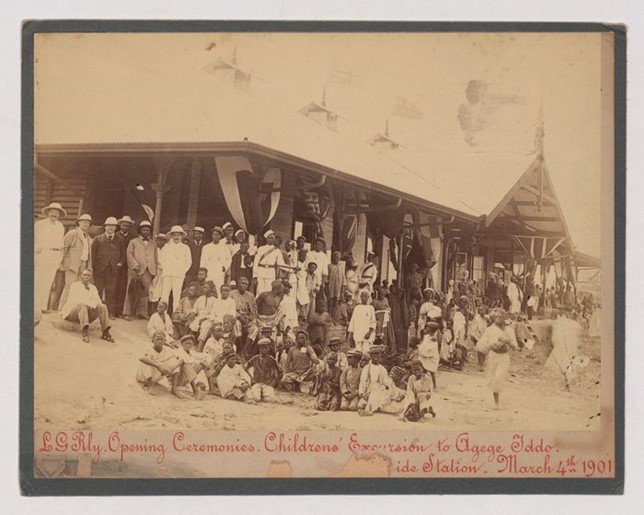
The status of being the breadwinner and income provider in families benefited male workers in many ways. However in reality many women also supported their families through income generated from trading, handcrafting and other activities; works that were considered informal because they took place outside the formal wage-earning system. While some may argue that the status of male breadwinners benefitted women and wives, giving them claims to parts of the men’s salaries; it simultaneously served to form views around masculinity, provided financial security, upward mobility for the male folk and allowed men to have large families which increased their social status in society while reinforcing the perceptions of husband breadwinners and dependent wives which served to diminish the value of work done by girls, women and wives. Attitudes that sadly permeate modern-day Nigerian society.
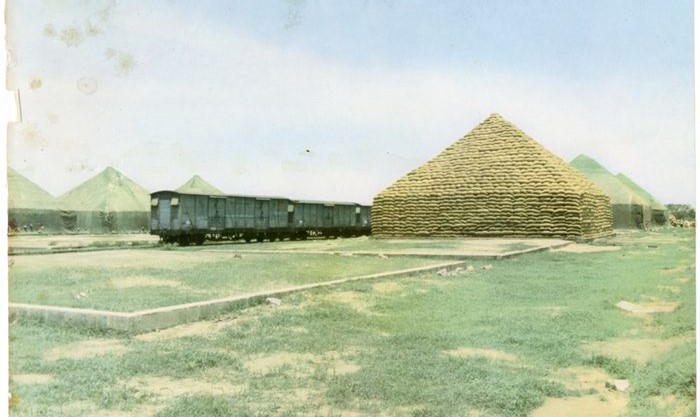
While this example shows the huge value of women’s labour and work done informally in many communities, changing attitudes towards the value placed on work done by women still remains difficult. Cultural sensibilities around economic status between husbands and wives oftentimes mean women are not able or allowed to be vocal about the financial responsibilities they take on in their households. And the status of breadwinner still determines who gets access to education, jobs, pay raise, opportunities etc. Sadly, these legacies of coloniality, gender categorization and social perceptions from the past railway system permeate into the urban fabric, mobility systems and spatial planning we have today in cities.
While significant progress has been made toward attaining the Sustainable Development Goals (SDGs) globally, in the last few years, much of the progress towards reducing inequalities and achieving the SDGs has been reversed as a result of the Coronavirus pandemic which brought the world to a halt. According to various data, within the first few months of the pandemic and widely implemented lockdowns, vulnerable people living with disabilities, youths, women, small businesses, low-wage and informal sector workers etc became severely affected.
But beyond existing data, the severe impact on women in various communities will likely never be known. As women oftentimes earn lower wages due to existing gender-pay biases, run small businesses that often have limited or no access to credit facilities, make up a huge population of informal workers who do not have any form of social safety net, and carryout the bulk of unpaid labour and care work. Coupled with the rising frequency of climate disasters and the ongoing Russia - Ukraine war that is devastating global food systems and supply; there is a rise in extreme poverty, injustice and inequalities globally.
Women and girls are still often denied access to work and hindered from economic participation due to social, cultural and religious barriers. By denying the rights and marginalizing a significant part of the population, achieving the SDGs by 2030 becomes much more difficult. Through conversations with several women on their work and connections with the present-day Railway system in Southwestern Nigeria, I explore issues of access, wage labour, child care, gender, community, memory, social and urban mobility etc. Connecting the dots between the past, present and future.
Grace – Assistant Project Lead.
At some point in history, the Nigerian rail system was one to reckon with. Fast forward to present day, the ruins of abandoned locomotives and tattered sheds are a stark reminder of a once thriving means of transportation and a huge employer of wage labour. Much of the railway’s history, architectural heritage and huge socio-economic impacts are hardly talked about these days.

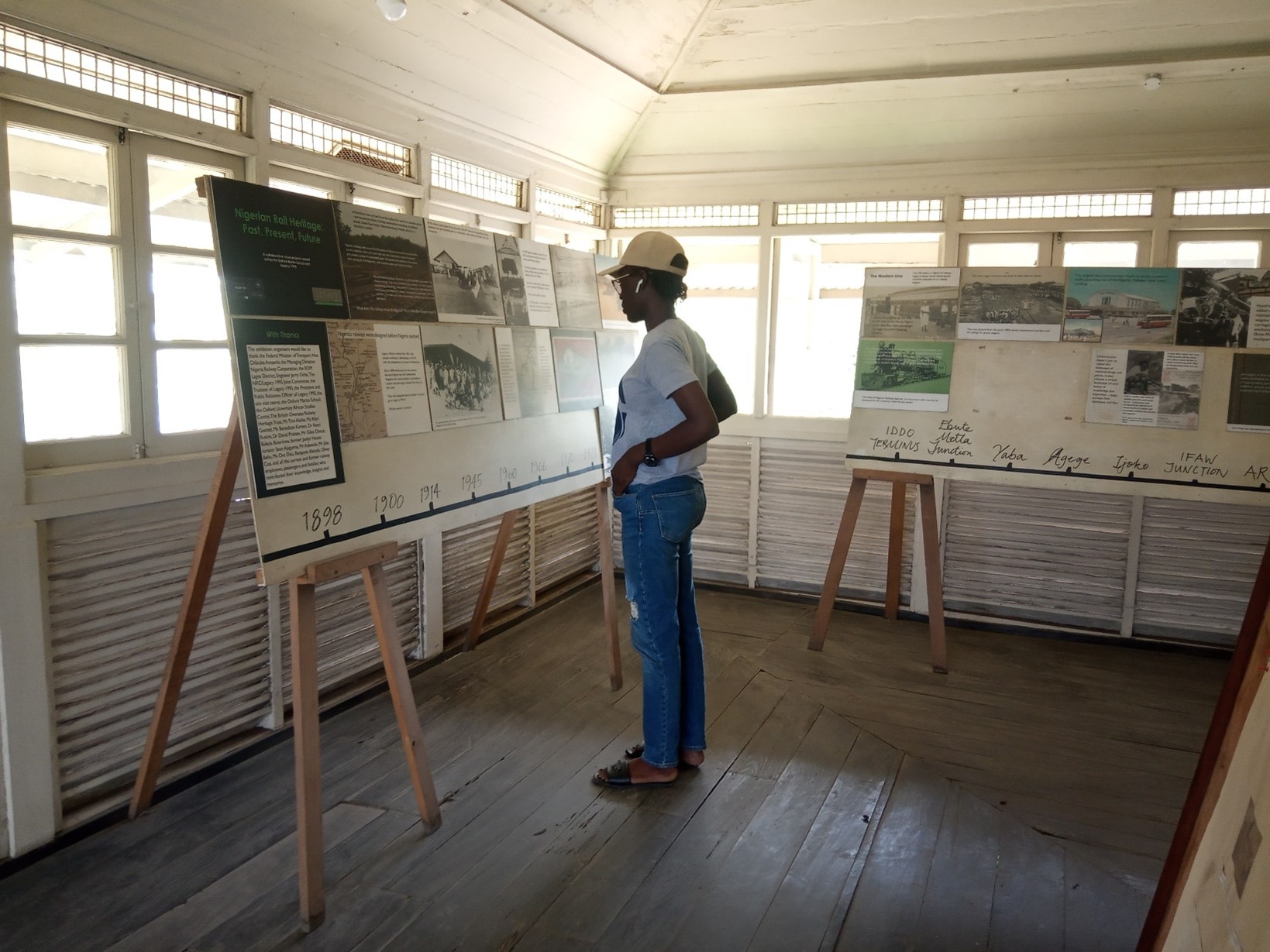
Grace is a member of Legacy 1995. In 2022, she worked as an assistant Project lead on the Endangered Archives Digitization Project (EAP); a pilot project on the archives of the Nigeria Railway Corporation within the railway compound in Ebute-Metta, Lagos. The project which is a collaboration between Nigeria Railways Corporation, the heritage NGO Legacy 1995 and British Library aims at preserving railway history and heritage.
The EAP project surveyed all available materials beginning from 1890s to mid-20th century, digitized a representative sample of Civil and Mechanical Engineering archives as well as personnel records which are currently endangered due to storage conditions and neglect but hold valuable information on technological feats, national and social history.
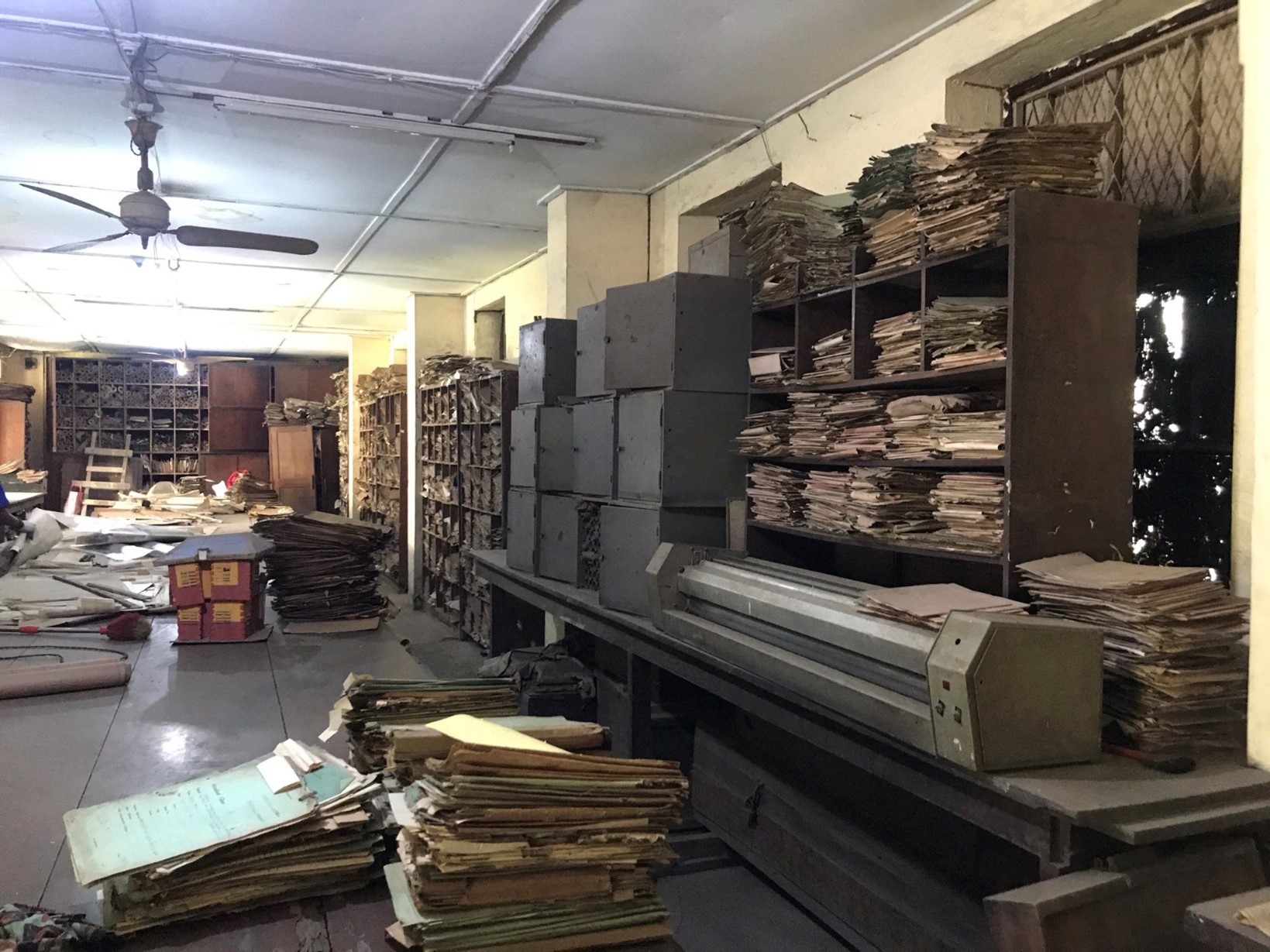
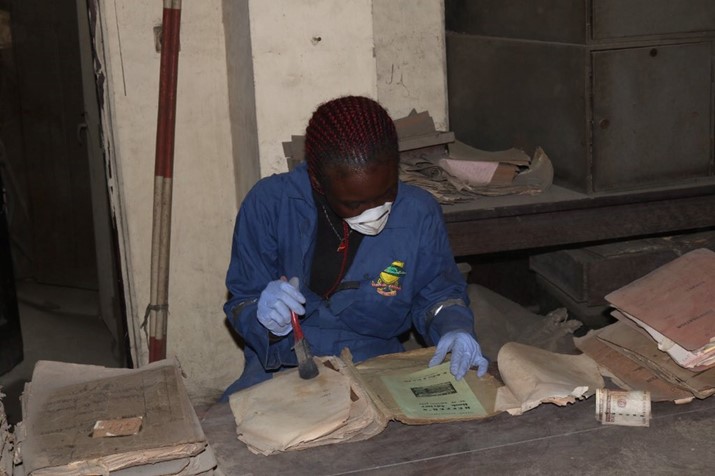
Through the project, Grace was involved in the training of 21 people and managing a core team made up of 7 people. Taking on this leadership role wasn’t always easy as she was the youngest team member and a female leader. However, her people skills, educational qualifications and past work experiences helped her manage the team well. Her leadership experiences working as part of the EAP team, the skills learned and the training provided helped her take on more challenging roles and embark on exciting projects. She believes access to jobs and professional development for everyone allows women to contribute their best and builds inclusive societies.
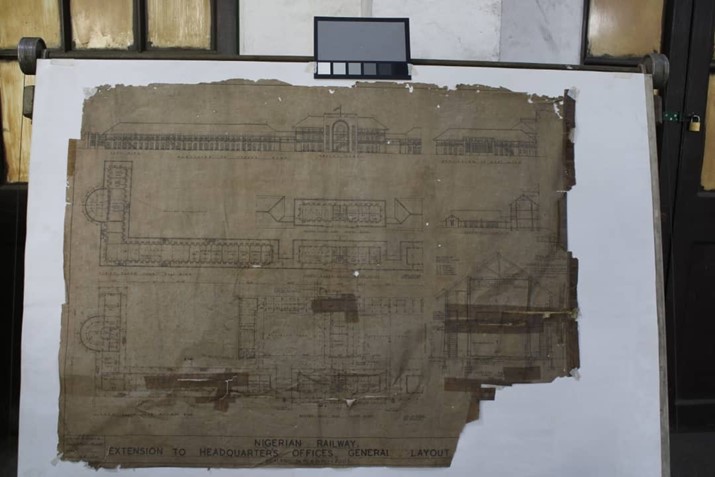
Tani – Railway Pensioner.
Tani recalls her time working at the railway with mixed emotions. On one hand, it was an exciting moment, a thing of pride as many people in her community regarded railway workers and personnel in high esteem. On the other hand, she also recalls this period as a difficult time for her as a woman, wife and young mother. Working hours and schedules which changed depending on workload and tight deadlines while caring for her family and child were sometimes overwhelming. One of her most difficult experiences was when she almost quit her job on the day of resumption after maternity leave from having her first child, because she could not care for her baby due to the huge workload and long work hours.
Her journey working in the Nigerian Railway Corporation began in 1982 after completing her secondary school education and enrolling for 9 months of training at the Railway Administrative Staff School in Kafanchan; where trainees came from all the different districts across Nigeria. She remembers her career journey not being easy. From training as a typist on Grade III, progressing to Grade IV after training school and reaching Senior staff Level VII later in her career; learning to use regular typewriters, then progressing to electric typewriters and becoming a secretary who worked with computers.
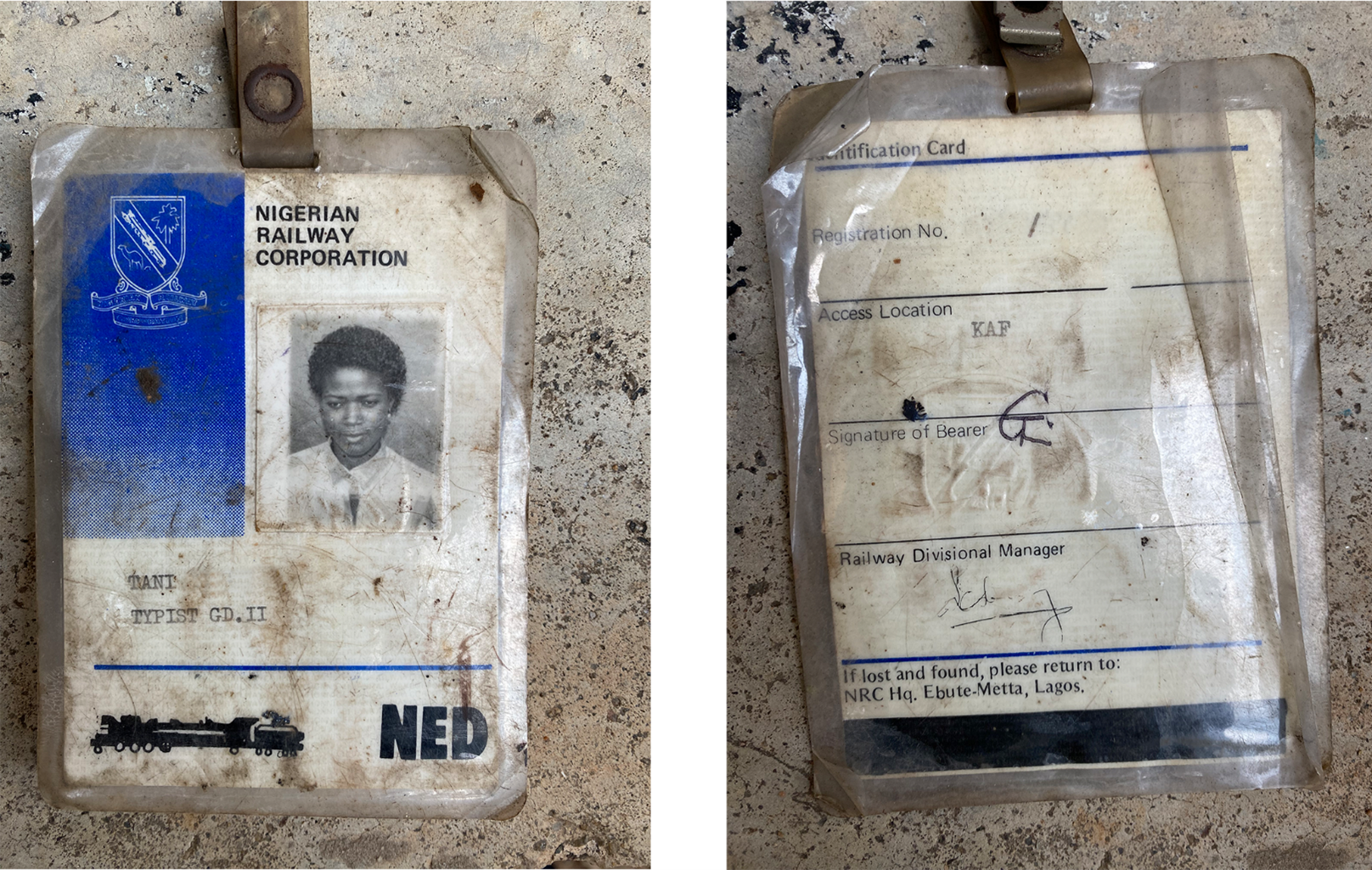
For her, the Nigerian Railway Corporation (NRC) was more than a job. It was family. She also achieved several milestones while working at the railway. She met her husband who was also a railway personnel and training teacher. At the beginning of her career she had her first child while working at the railways and boarded a train for the first time after several years working with the NRC.
She also remembers the camaraderie and support between female typists which helped her through the difficult times and her supervisor, a Yoruba woman from Ogbomosho who was very supportive. Kafanchan a railway town in Southern Kaduna served as a junction that linked all parts of the country. The train system carried people, fertilizers, food and other items from various regions of Nigeria . Special wagons which accommodated market men and women traveling with their goods and train trips passing through various communities and different stops gave many passengers the opportunity to buy cheap foodstuffs along their journeys. The train system brought many Nigerians together through travels and meetings with different people.
Coming from a polygamous family, her income helped her support and build a house for her mother. Regular salary payments meant her family had a stable income from her and her husband; however, there were also periods when the payments were delayed for several months and as a family wholly dependent on their salaries from their railway work, she engaged in the trading of food items at the markets in order to support her family. Balancing family life and building a career working in the railway system was only through the grace of God, her efforts, a supportive husband, her mother who helped with caring for her child and trustworthy neighbours who she could rely on for assistance.
Later in her career, she was transferred to Lagos, where she worked till her retirement as a principal secretary in 2017. She believes a more supportive senior management staff would have made working conditions better and easier for women during her time. And that female railway workers now have access to more opportunities and better working conditions today.
When asked if she believes women can also be the breadwinners, she says it was typical during her time for men to be breadwinners and the wife’s role to support her husband and family, particularly in situations where the husband is not able to provide due to genuine reasons. She also acknowledges that times have changed; nowadays many women are increasingly becoming the breadwinners in their families because a lot of men are not stepping up to their responsibilities, also secretary jobs which were often held by women are now held by either gender.
Igwowo – Railway worker.

Igwowo has been working for over 4 years at the Nigerian Railway Corporation district Ebute Metta Junction which manages the Lagos-Ibadan Railway corridor. She believes the present-day railway system is often viewed by outsiders as being male dominated. However, there are various departments such as Engineering, Mechanical, Civil works, Public Relations etc. and the ratio of men to women varies from one department to another. For example, in her department, there are roughly 5 women for every man.
For as long as she can remember, she always wanted to work in the railway system just like her father who was an engineer at the NRC till his retirement in 2003. Before his transfer to Lagos, he worked on the Enugu Eastern Rail route. She recalls with fond memories meeting people and making friends during their family trips from Enugu to Kaduna which usually took 2 days traveling by train.
Her father was particularly happy that she was going to work in a modern standard gauge rail line system in comparison to the narrow gauge rail line system he worked on during his time. Although he encouraged her to join the railway system as an engineer, her passion for engaging and interacting with people made her apply for a public relations role which allows her to meet different people and help commuters enjoy their travel by train.
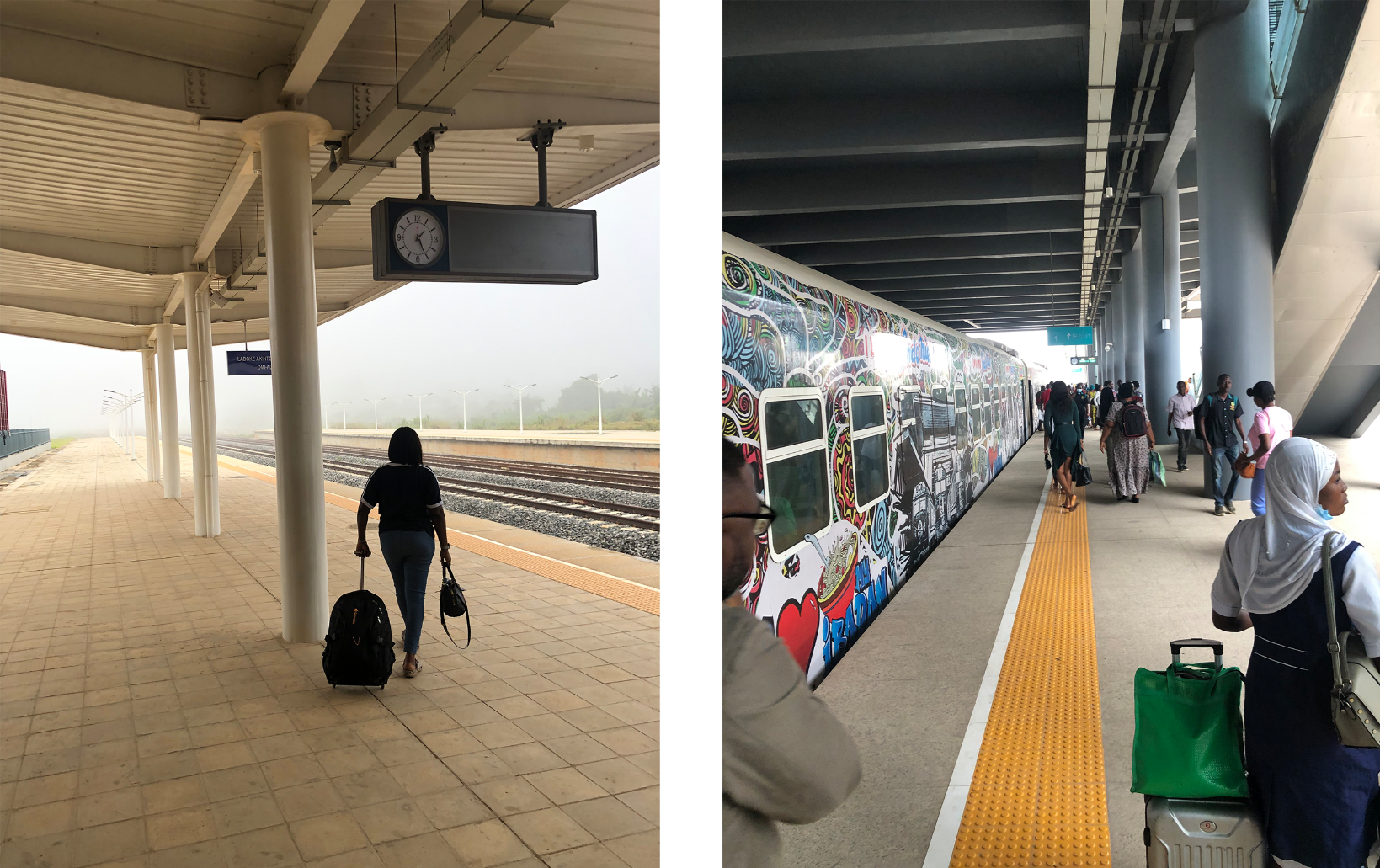
She says the wonderful thing about the present-day railway system is that it encourages anyone who is qualified irrespective of gender to freely apply for available positions whenever there are job openings. In her opinion and experience, anyone with relevant qualifications is always welcome to join the Nigerian railway system which provides relevant training locally and abroad depending on the job description.
In the past many girls and women avoided engineering-related courses at the secondary school and university level; but that is no longer the case. Women studying these courses are able to join as engineers, train drivers etc. And increasingly, women are also realizing that they can work in the railway system and take on leadership roles at district level positions, station managers level etc. Like many other industries, women’s participation and contributions to the railway system is tremendous.
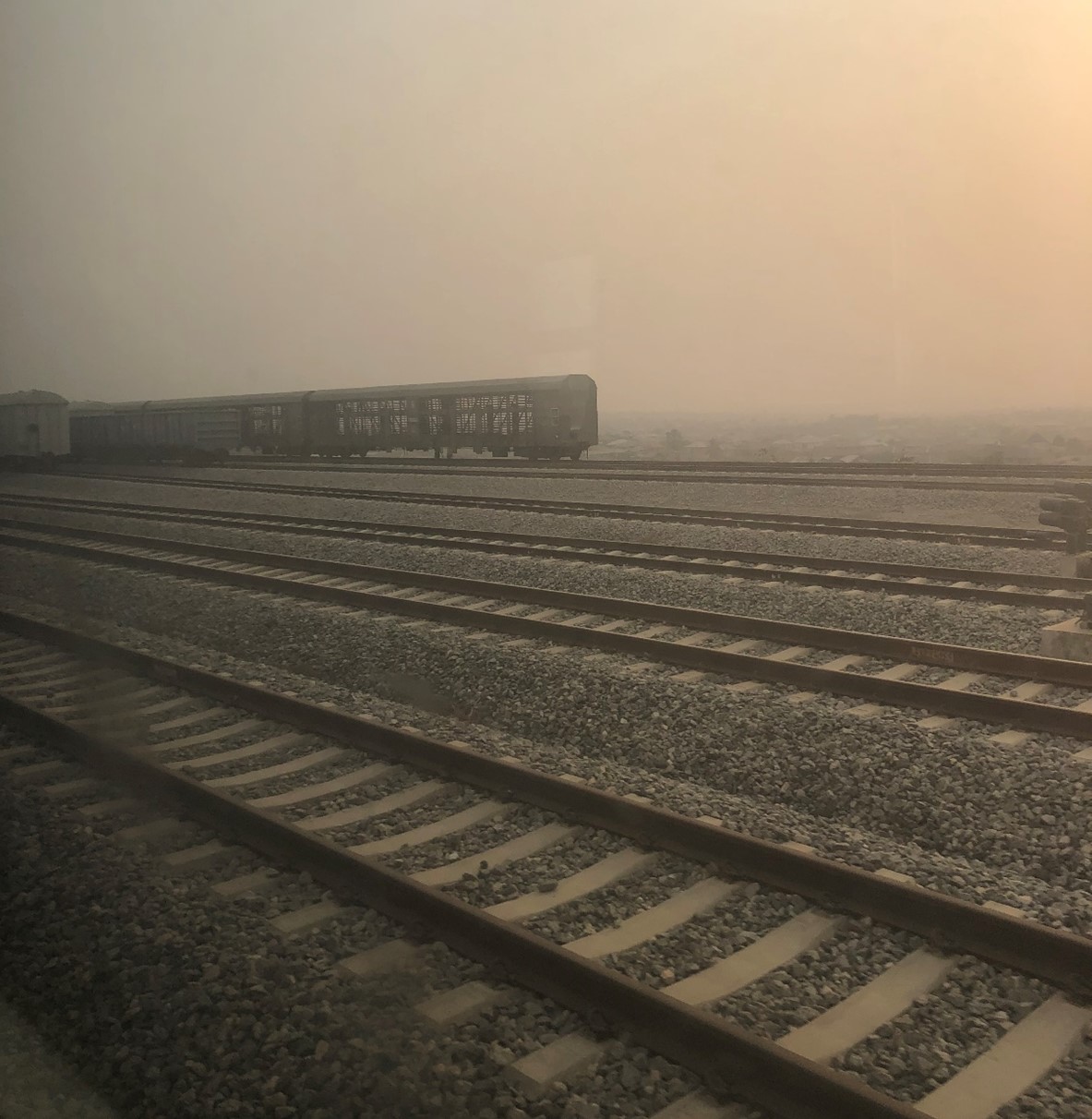
Fasila – Trader.
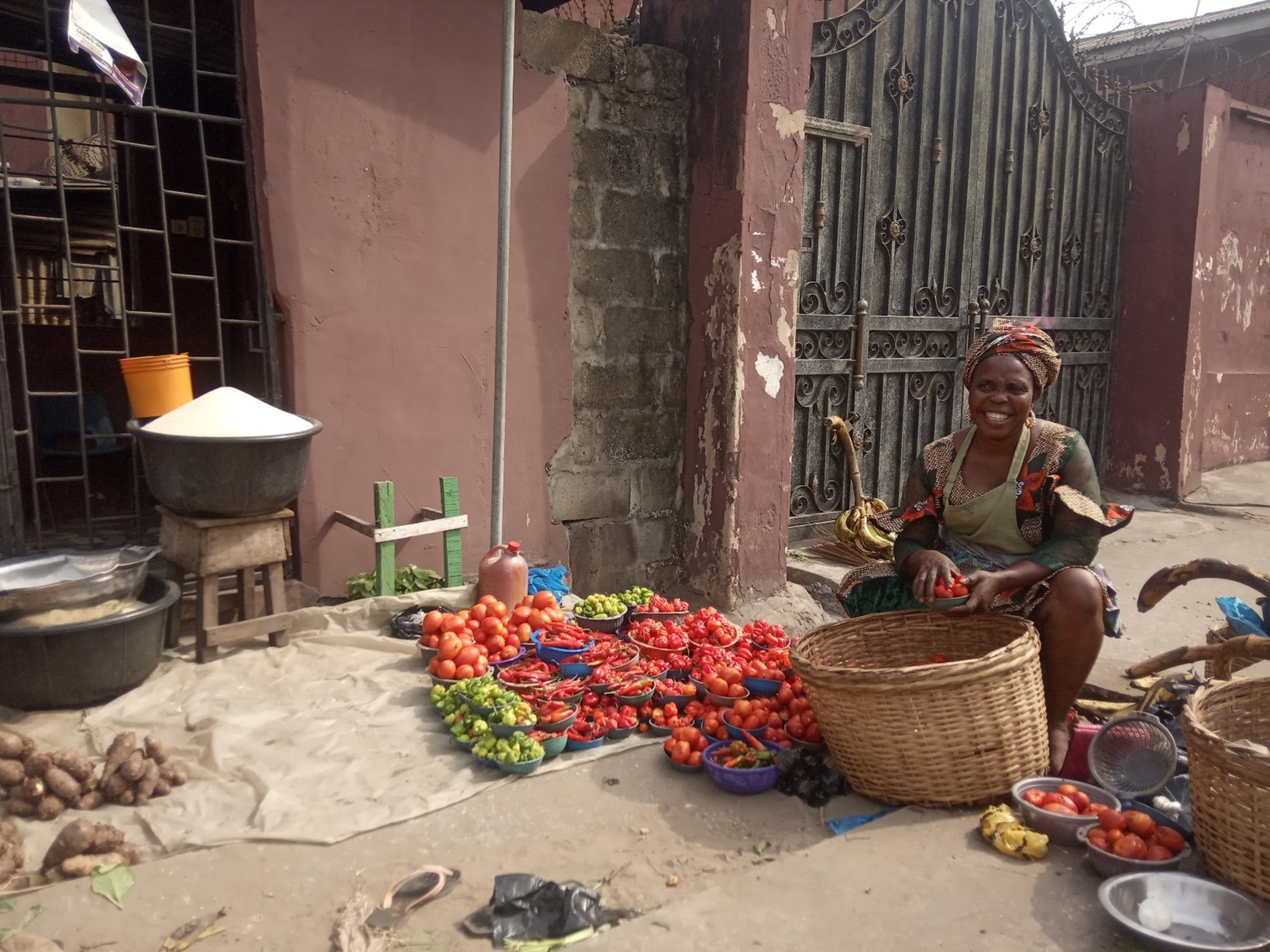
Fasila popularly known as Iya Ijebu sells agricultural produce and foodstuff in a residential area of Surulere, Lagos on Thursdays and Sundays. While it may not seem significant, she saves many of her customers living in the area time and money that would otherwise be spent making trips to the market or purchasing the same items at a higher price in supermarkets.
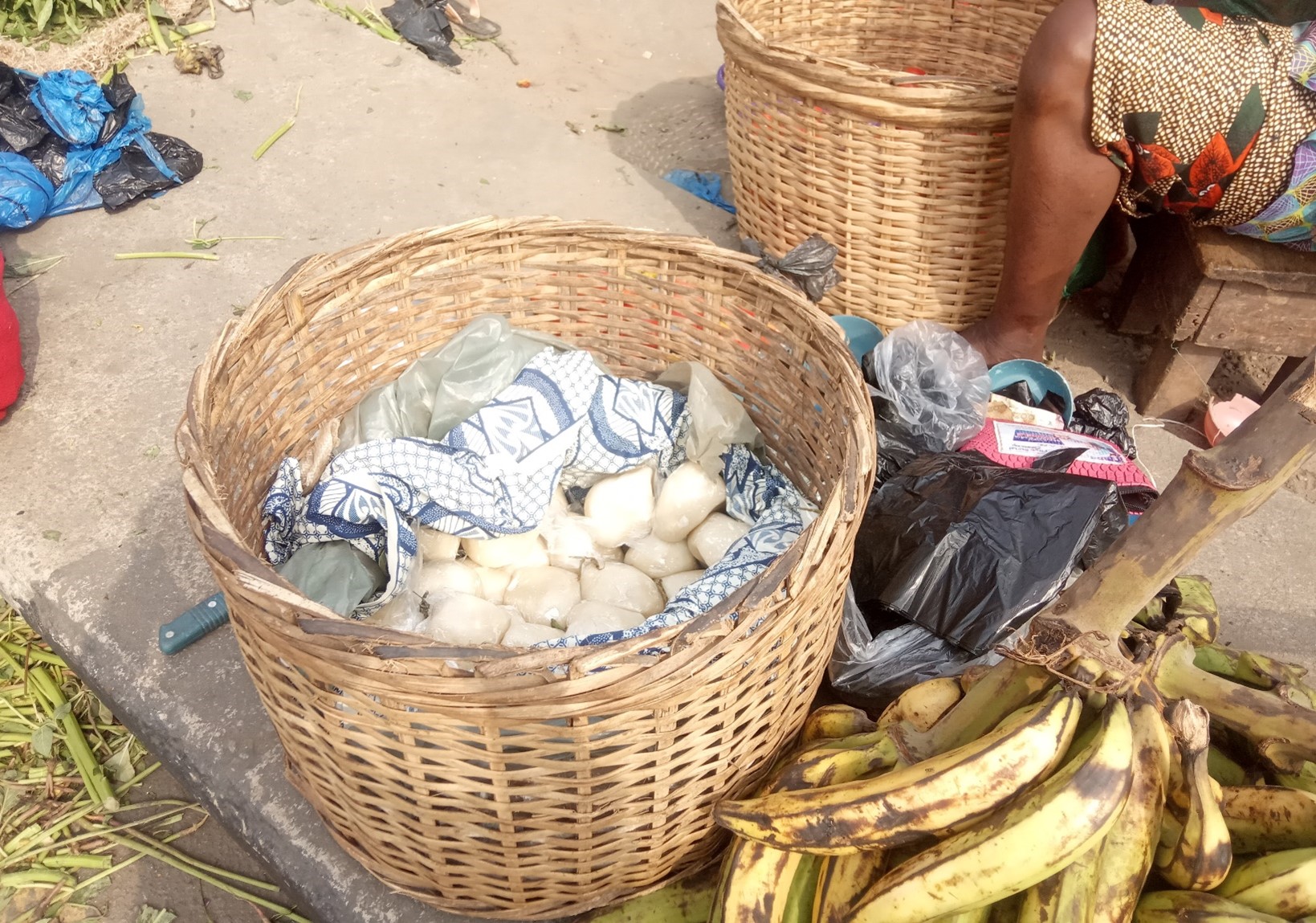

Olamide - Urban Activist, researcher, writer and artist.
Trains are a more sustainable means of transportation and solution to urban mobility challenges, and they rely on other forms of mobility solutions such as good public transport systems, car-sharing, tricycles, buses, cycling and walking infrastructure etc.
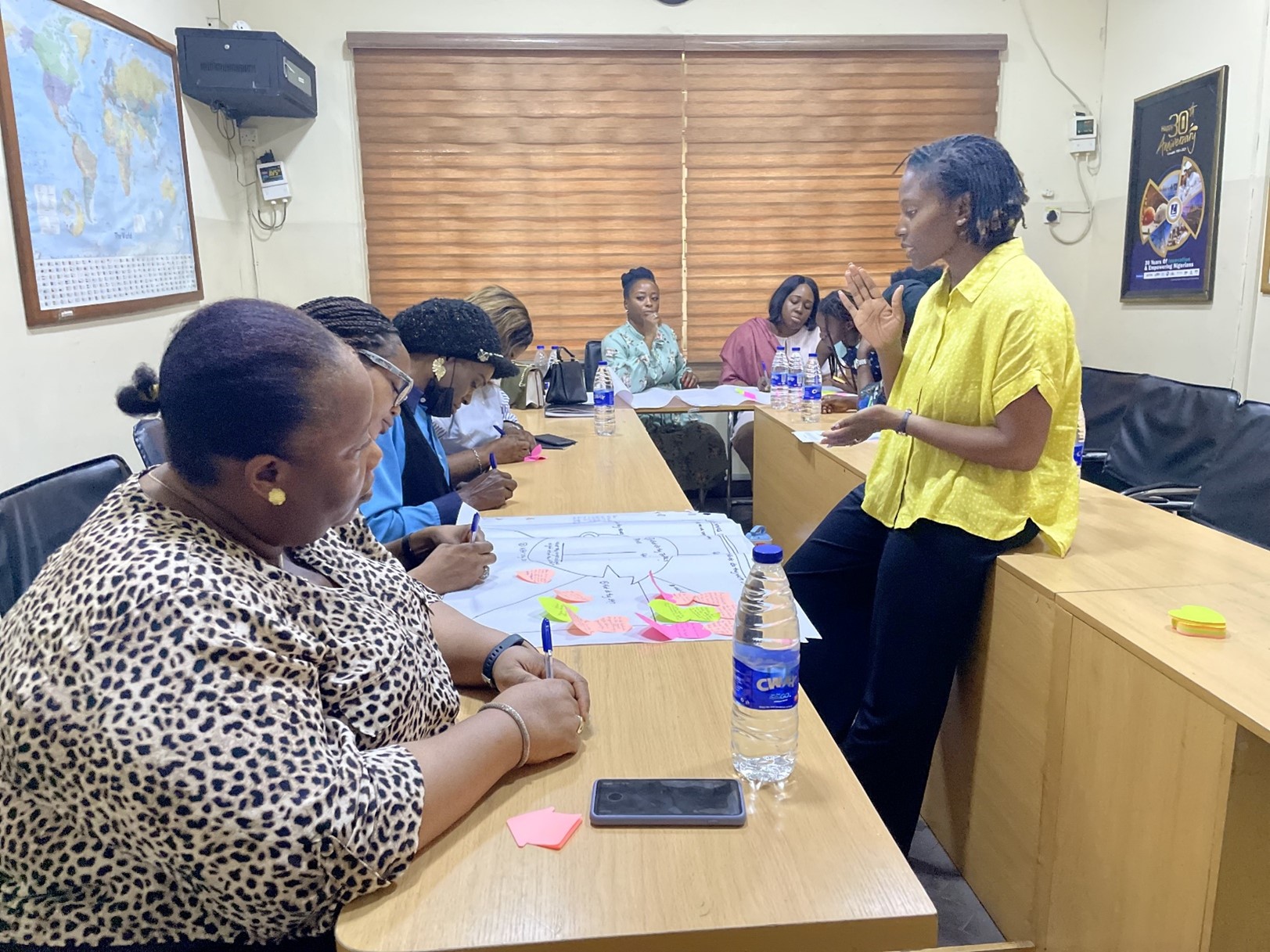
Olamide is the Executive Director of Lagos Urban Development Initiative (LUDI), a non-governmental organization that brings organizations and people together to advocate for a more inclusive, liveable, and sustainable Lagos through collaboration, research and dialogue. Her work on various sustainable transportation and social development projects in collaboration with local and international institutions highlights the need and importance of inclusive planning and women-centred design of urban spaces, as well as enshrining women’s safety and rights in the city.
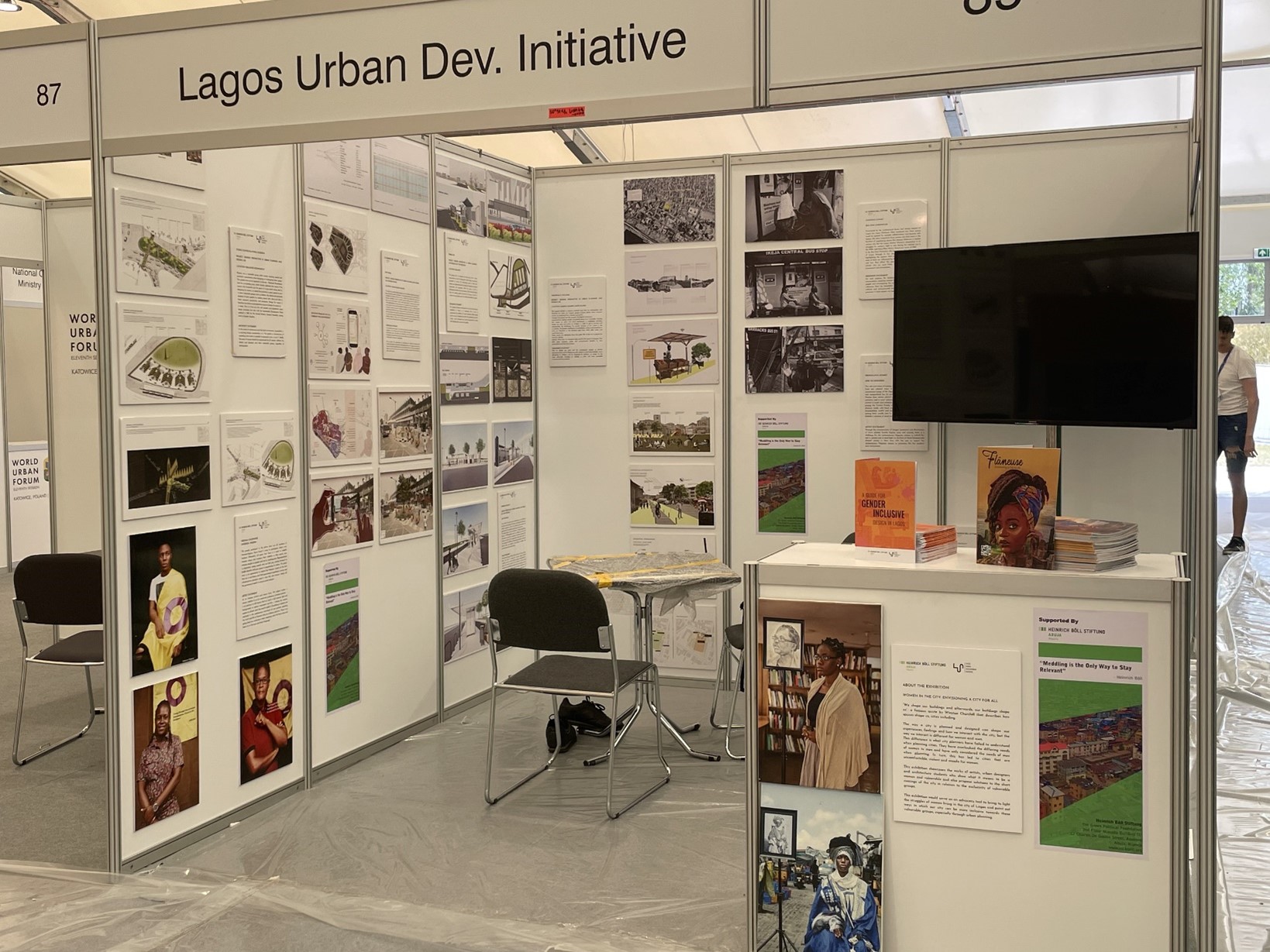
Presently, many girls and women do not feel safe when accessing city transportation and public spaces such as streets, sidewalks, bus stops, marketplaces, parks etc. This as well as a lack of female perspectives on urban planning and design of our cities greatly affects their experiences and practical needs and limits their access to resources, income-generating activities and crucial contributions toward the Sustainable Development Goals. Urban planning and design across many cities are often gender-blind, a problem in urgent need of fixing.
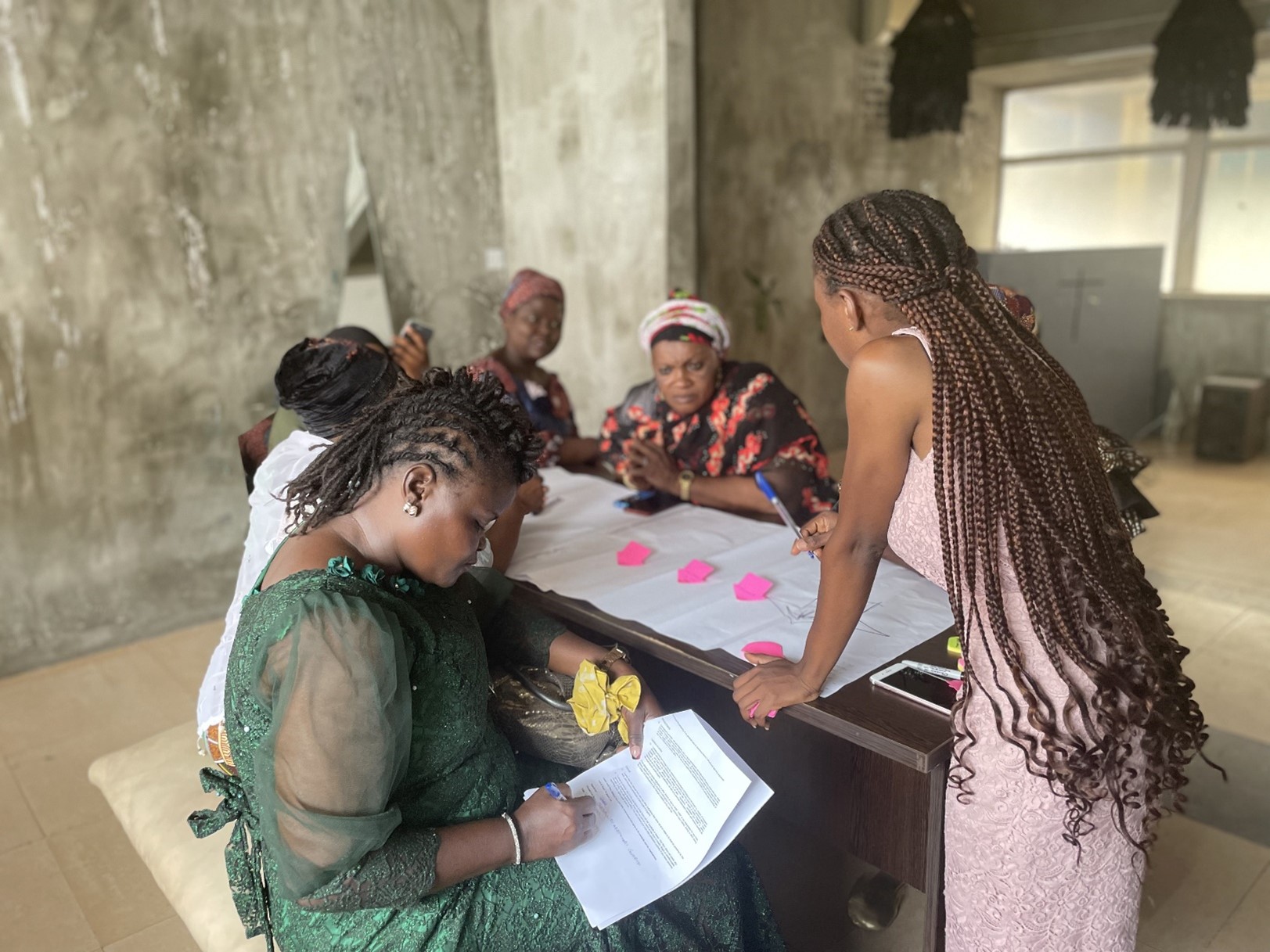
Citizen participation and contributions play a significant role in the design and planning of equitable cities. Through their work, organizations such as LUDI are bolstering women’s safety, access and active participation in cities; thus, contributing to the SDGs in various communities. Olamide believes in women having the right to make decisions for themselves, and contributing to the way our cities are designed, planned and used.
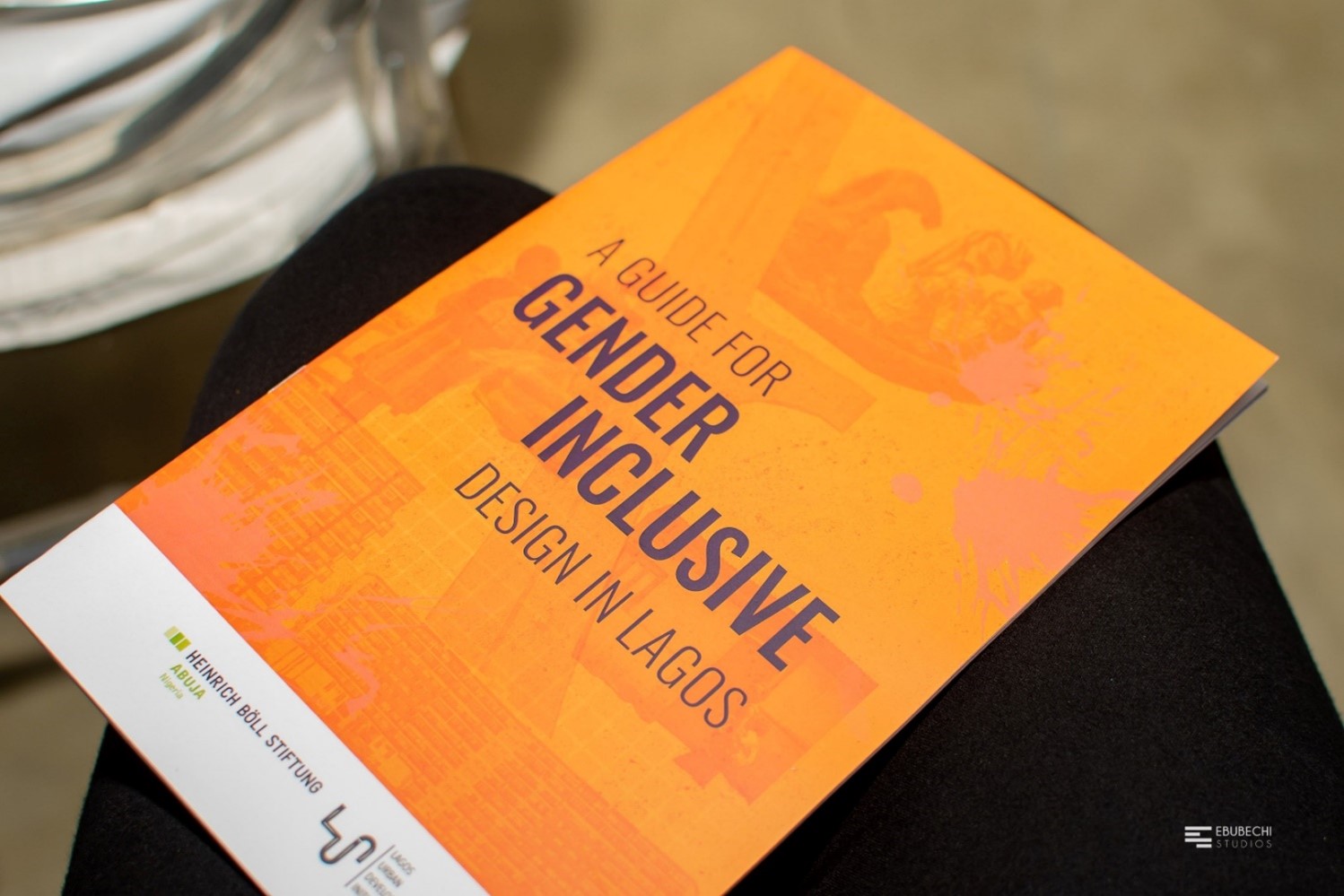

Colonial legacy, Revival and Sustainable future
Serving as architectures of logistics, rail construction and infrastructure are presently redefining the urban landscape and spatial planning across many African cities. In some countries, colonial Britain-built African railways are even being resurrected. Through Chinese funding and expertise, the Nigerian railway system has been given a new lease on life. The revival of the railways is seen by some as an equal partnership and win-win for both countries; with Nigeria receiving the funding and support needed to build much-needed railway infrastructure and the expansion of China’s Belt and Road Initiative.
With Nigeria’s population on the rise, cities which are often drivers of economic growth will continue to attract many in search of opportunities. An inclusive and efficient railway system that helps address increasing pressures on road infrastructure, traffic congestion, air pollution etc is therefore a necessity for cities like Lagos to thrive and remain productive.
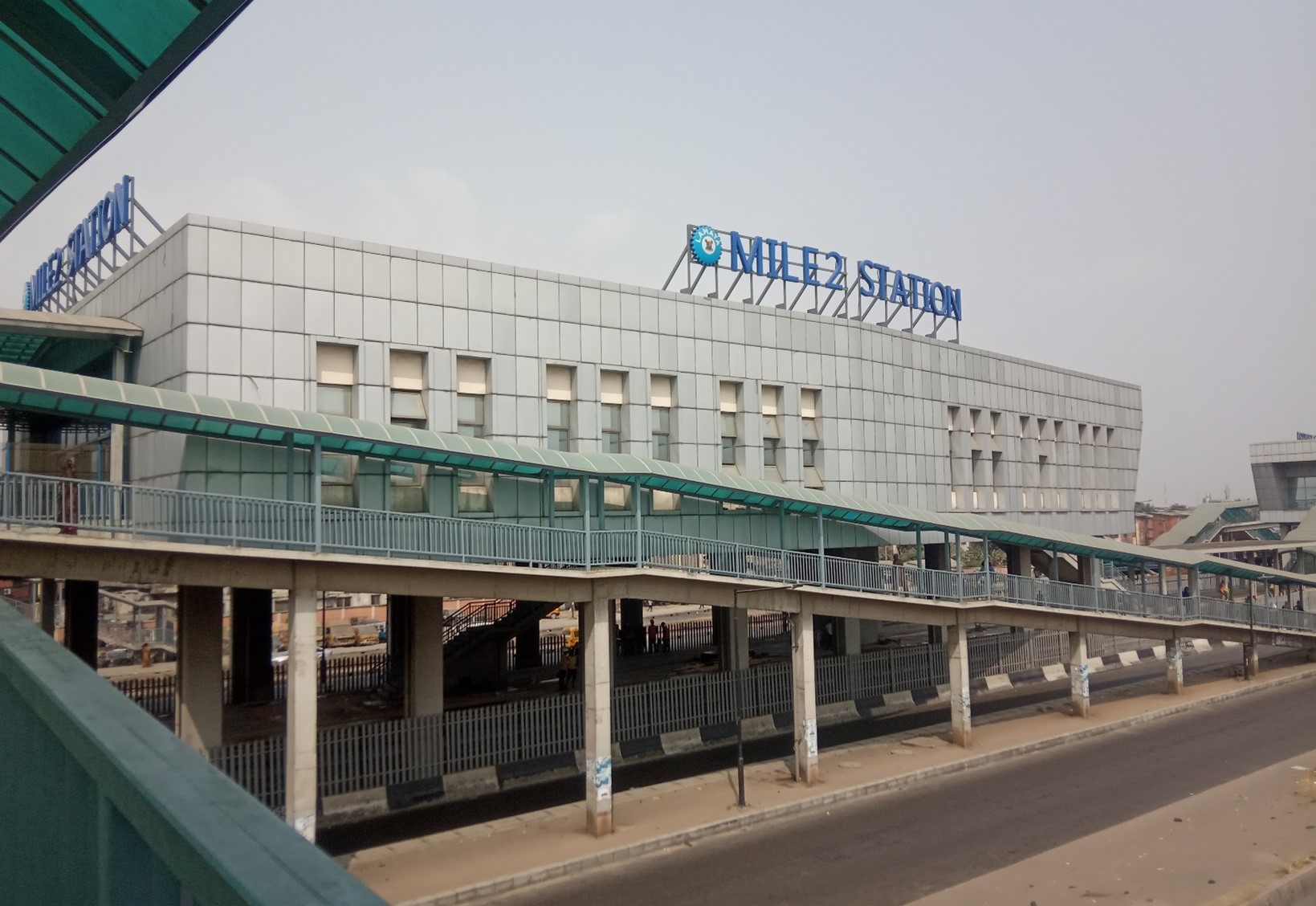
Asides from job creation and improved urban mobility, a modern rail system is key to combating climate change which is having devastating effects across Nigeria with women and girls bearing the brunt. No doubt, the ongoing development of the Nigerian railway system will have huge economic, political, environmental, cultural and social impacts in the future. Employing, training and promoting the visibility of more women and girls in the railway system, will help in dismantling its past legacy and perceptions around gender, family and access to wage labour. The railway’s contributions towards the development of sustainable cities along its routes are crucial; ensuring better access to resources, enshrining safety and rights, creating care economies and a gender-responsive public service will benefit women and girls. Unlocking the full potential of roughly half of Nigeria’s population, enabling them to achieve their best and contribute towards attaining the SDGs.
References
Lailvaux, C., Ribet, L., & Lunt, T. (2022). Decoding women’s transport experiences: A study of Nairobi, Lagos and Gauteng. WhereIsMyTransport.
Akoni, O. (2022, December 21). Just in: Lagos Rail Mass Transit: Marina-Mile-2 blue line ready. Retrieved from Vanguard: https://www.vanguardngr.com/2022/12/just-in-lagos-rail-mass-transit-marina-mile-2-blue-line-ready/
Barnes, S. T. (2004). Review of Working with Gender: Wage Labor and Social Change in Southwestern Nigeria, by L. A. Lindsay. Retrieved from The International Journal of African Historical Studies, 37(3), 539–541: https://doi.org/10.2307/4129044
Bristol Archives: British Empire & Commonwealth Collection, 2002/067/1/16. Jaekel collection, 1955. (Accessed January 2023).
Bristol Archives: British Empire & Commonwealth Collection,1999/221/1/4/2. Crown Agents Collection, 1890-1981. (Accessed January 2023).
British Library. (2021). Endangered Archives Programme. Nigerian railway archives at Ebute-Metta: Joint Committee Collaboration (EAP1418). Retrieved from British Library Website: http://eap.bl.uk/project/EAP1418
Dixon, N. (2016, July 14). The rise of citizen-led design as an answer to century-old models. Retrieved from Mail and Guardian: https://mg.co.za/article/2016-07-14-00-the-rise-of-citizen-led-design-as-an-answer-to-century-old-models/
Editorial. (2023, January 5). As The Lagos Rail Mass Transit Kicks Off. Retrieved from Daily Trust: https://dailytrust.com/as-the-lagos-rail-mass-transit-kicks-off/
Egbunike, N. (2021, June 7). Belt and Road Initiative projects ramp up Nigeria’s favourable perception of China. Retrieved from Global Voices: https://globalvoices.org/2021/06/07/belt-and-road-initiative-projects-ramp-up-nigerias-favourable-perception-of-china/
Legacy 1995. (2022, October 15). How the Railways Shaped Nigeria - Legacy Webinar. Retrieved from Youtube. Legacy1995ng Channel: https://www.youtube.com/watch?v=04nhq4jns-4&t=2s
Lindsay, L. A. (1998). “No Need... to Think of Home”? Masculinity and Domestic Life on the Nigerian Railway, c. 1940-61. Retrieved from The Journal of African History, 39(3), 439–466: http://www.jstor.org/stable/183362
Lindsay, L. A. (1999, June). Domesticity and Difference: Male Breadwinners, Working Women, and Colonial Citizenship in the 1945 Nigerian General Strike. Retrieved from American Historical Review.
Owen, O. (2020, July 15). Nigerian Rail Heritage: Past, Present, Future. Retrieved from TORCH | The Oxford Research Centre in the Humanities: https://www.torch.ox.ac.uk/article/nigerian-rail-heritage
Sodergren , M.-C., Kapsos, S., & Karkee, V. (2022, March 21). COVID-19 and the Sustainable Development Goals: Reversing progress towards decent work for all. Retrieved from International Labour Organisation ILOSTAT: https://ilostat.ilo.org/covid-19-and-the-sustainable-development-goals-reversing-progress-towards-decent-work-for-all/
Sturgis, S. (2015, February 2). How Overlooked Colonial Railways Could Revolutionize Transportation in Africa. Retrieved from Bloomberg: https://www.bloomberg.com/news/articles/2015-02-02/how-overlooked-colonial-railways-could-revolutionize-transportation-in-africa
The first female train driver at CCECC Nigeria Ltd. (2020, July 26). Retrieved from Youtube. CCECC Channel: https://www.youtube.com/watch?v=YdS-pzCWlDo
UN Human Rights. (n.d.). COVID-19 and the 2030 Agenda for Sustainable Development. Retrieved from United Nations Human Rights Office of the High Commissioner: https://www.ohchr.org/en/sdgs/covid-19-and-2030-agenda-sustainable-development
United Nations Department of Economic and Social Affairs (DESA). (2021, July 6). Sustainable development report shows devastating impact of COVID, ahead of ‘critical’ new phase. Retrieved from Africa Renewal: https://www.un.org/africarenewal/news/sustainable-development-report-shows-devastating-impact-covid-ahead-%E2%80%98critical%E2%80%99-new-phase
Wikipedia contributors. (2022, September 20). Jaekel House. Retrieved from Wikipedia, The Free Encyclopedia: https://en.wikipedia.org/w/index.php?title=Jaekel_House&oldid=1111236606
Xuan, J. (2021, May 13). First female train driver in Nigeria pursuing dream on China-constructed rail line. Retrieved from People's Daily Online: http://en.people.cn/n3/2021/0513/c90000-9849502.html

Sarafadeen Bello is an Architectural Designer, Independent researcher and creative based in Lagos, Nigeria. He holds a degree in Architecture from Ivanovo State Polytechnic University in Russia. In 2016, he won the Ships and Ports Essay Competition; was shortlisted for the Ken Saro Wiwa Book Review Prize at the Lagos Book and Arts Festival in 2019 and placed second in the “How can we obey the law against war” essay competition in 2020.
He participated in the Remote Research Residency “Memory and Memoricide of Land” – Reimagining alternative models of Museums cooperated by Co.iki (Japan), supported by KOFICE (South Korea) in 2021 as part of “Project The Great Museum”. And received a Guest Artists Space (G.A.S.) Foundation Fellowship Award in 2022. As part of his residency at G.A.S. Foundation, he conducted research into Technoheritage and Archives; and curated an exhibition titled “Artefacts (Re)connecting…Can you sense them?” (2022)
Currently, his practice explores the notion of access in relation to the discourse around decolonization, restitution and repatriation of cultural artefacts, objects and heritage materials (Benin Bronzes) with interests in archival materials and the Pan-Africanist movement. His medium of expression is through text, essays, research, design and installations. And his areas of interest operate within the overlapping boundaries of architecture, urban design, food systems, theatre, culture, social inclusion as well as public realm participation. He strongly believes in the power of volunteerism and arts as a tool for social change.
His writings and contributions can be found in African Union ECHO digital magazine 2017, Lagos Development Envision Lab 2017 Publication, The Great Museum website etc. Currently, he is co-curating and working on a Cross-Cultural Digital Exchange and Research Residency Project between Nigerian and Dutch Artists scheduled to take place in 2023.
He participated in the Remote Research Residency “Memory and Memoricide of Land” – Reimagining alternative models of Museums cooperated by Co.iki (Japan), supported by KOFICE (South Korea) in 2021 as part of “Project The Great Museum”. And received a Guest Artists Space (G.A.S.) Foundation Fellowship Award in 2022. As part of his residency at G.A.S. Foundation, he conducted research into Technoheritage and Archives; and curated an exhibition titled “Artefacts (Re)connecting…Can you sense them?” (2022)
Currently, his practice explores the notion of access in relation to the discourse around decolonization, restitution and repatriation of cultural artefacts, objects and heritage materials (Benin Bronzes) with interests in archival materials and the Pan-Africanist movement. His medium of expression is through text, essays, research, design and installations. And his areas of interest operate within the overlapping boundaries of architecture, urban design, food systems, theatre, culture, social inclusion as well as public realm participation. He strongly believes in the power of volunteerism and arts as a tool for social change.
His writings and contributions can be found in African Union ECHO digital magazine 2017, Lagos Development Envision Lab 2017 Publication, The Great Museum website etc. Currently, he is co-curating and working on a Cross-Cultural Digital Exchange and Research Residency Project between Nigerian and Dutch Artists scheduled to take place in 2023.

